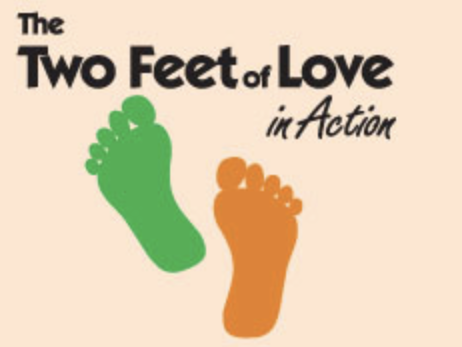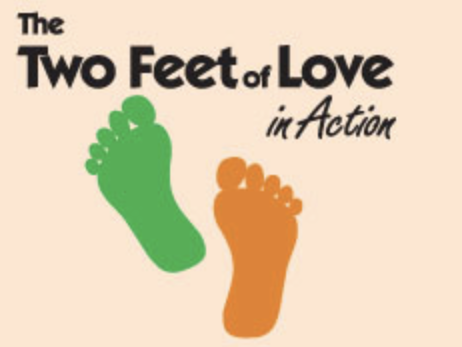by Christine Warloski
I recently was involved in a community conversation that raised questions about the lines between ‘justice’ and ‘charity’.
In my faith tradition, as a Pastoral associate with St. James the Greater Catholic Church, we talk about the “Two Feet of Love in Action” – one foot is justice and the other is charity. Here is the definition of each from the US Bishops:
“We step with this [the Justice] foot when we work to address the root causes of problems facing our communities by advocating for just public policies and helping to change the social structures that contribute to suffering and injustice at home and around the world.
We step with the Charitable Works foot when we work to aid or assist others both locally and globally to meet their immediate, short-term needs. Examples include engaging in direct service or providing food, clothing, shelter, or monetary assistance to help those in need.”
Charity is, in my opinion, both better understood and better supported by the general public. People who care about the most vulnerable are often excited about providing for other people. At my church, whenever we hold a drive for something – food, winter gloves, school supplies, and so on – we are overwhelmed by the response. We have teams serving at most of the local direct service organizations. All of these efforts are tremendously important and much needed. And as people of faith, we are clearly called to take care of those around us in a directly tangible way.
Justice work often is difficult and nebulous work, with fewer immediate and tangible results. Charity is important, critical even, but if we don’t work on justice we will continue to have an ever growing need for charity. What does it mean to address systemic issues? What is the line between charity and justice, downstream versus upstream? These, to me, seem to be the questions near and dear to the heart of JONAH. After all, JONAH is a Justice organization, rather than a direct services or charitable one. It is there in the name of the JONAH website – jonahjustice.org. But sometimes that line isn’t always clear, and maybe sometimes JONAH’s mission gets a bit blurry because of it.
I was recently involved in a community conversation that showed clearly to me the confusion between justice and charity. A local entity looking for emergency shelter reached out to JONAH as they thought of JONAH as a resource who could solve the immediate issue. Perhaps the confusion was caused by the fact that many JONAH members are also heavily involved in direct service efforts related to this issue. I think however that at issue was the confusion about JONAH’s role in the community. JONAH Religious Leaders seem to me to be a small group of self-selected individuals and churches who want to join together to work on justice issues. Justice is our chosen mission and is desperately critical for change in our community. We have quite a few groups doing charity work in the area but not enough doing justice work. The community needs us to focus. Yet in this instance, insisting that JONAH is only a justice organization might have been too limiting; JONAH could be and often is bigger than that.
Logistically, the request for emergency help felt like something churches could or should be involved with., But JONAH leadership felt it should include all of the faith communities, not just the JONAH ones. JONAH felt too small to be the only avenue to faith communities in the area. Is there a better avenue to reach faith communities [or one could use “congregations” here just for some variation in terms]than the JONAH Religious Leaders email list? We are very careful about when that email list is used, as it is intended to be used for JONAH purposes only. Determining what qualifies as JONAH’s purpose is where it gets tricky. Charity creeps into JONAH’s work, and sorting out what is necessary direct service and what is true to our mission isn’t always clear.
Perhaps it should at times be a both/and instead of an either/or. Maybe the Religious Leaders could be an additional point of communication to garner charity in an emergency, without minimizing our mission of fostering change.
My belief is that as people of faith, we are called to exercise both feet: justice and charity. As members of JONAH, our collective focus needs to be on justice, but sometimes we may need to do both to be fruitful in the community. May all of our labors produce good fruit.
Submitted by Christine Warloski, Pastoral Associate at St. James the Greater Catholic Church. Co-Chair of the Religious Leaders Task Force.


